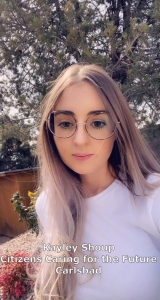Testimony on State Methane Rules: Kayley Shoup
 Members and supporters of New Mexico Interfaith Power & Light have prepared testimony for hearings held by the Environmental Improvement Board. The hearings, held the week of Sept. 20-24, are in support of the The New Mexico Environment Department’s (NMED) strong proposal to cut ozone-forming volatile organic compounds (VOCs) and methane released by the oil and gas industry. The first comment is from Kayley Shoup, an organizer for NM-IPL affiliate Citizens Caring for the Future.
Members and supporters of New Mexico Interfaith Power & Light have prepared testimony for hearings held by the Environmental Improvement Board. The hearings, held the week of Sept. 20-24, are in support of the The New Mexico Environment Department’s (NMED) strong proposal to cut ozone-forming volatile organic compounds (VOCs) and methane released by the oil and gas industry. The first comment is from Kayley Shoup, an organizer for NM-IPL affiliate Citizens Caring for the Future.
Hello my name is Kayley Shoup and I am an organizer with Citizens Caring for the Future in Carlsbad, and today I will be sharing why as a frontline community member in the Permian I strongly support the proposed methane and ozone rules. For years I believed, like many in my community still do, that regulatory agencies were doing their best to protect frontline communities like mine. As everyday I was learning of more young people being diagnosed with cancer, I continued to believe that we were being protected, that the pollution couldn’t be that bad, and that maybe I was just someone that was trying to find a reason as to why I was surrounded by so much tragedy.
Over the past year I have learned that all of those beliefs were false. Those of us in frontline communities actually aren’t being protected. I now know that the state does not have one air monitor that tracks methane or VOC pollution in the Permian Basin. I now know after being out in the field that the pollution is that bad and it is constant, and I also understand that two years ago I wasn’t just a girl trying to find meaning in seeing her loved ones ravaged by cancer but a girl that was starting to realize the danger that surrounded her.
Because of the abysmal lack of enforcement in the Permian we must have stronger rules such as those being proposed today. Rules that require things like frequent inspections, especially at sites near schools and neighborhoods. Rules that can be realistically enforced, such as I believe these rules can be. They are currently our only line of defense against methane and VOC pollution. I’m not sure how the Governor or NMED plans to slash methane pollution that they aren’t properly monitoring, but I do believe these rules are a start. As a community member in the region of the state that contributes the most to the New Mexico State Budget, I believe the least the state can do is implement the proposed rules. When we prioritize the needs of the communities most affected by methane and VOC pollution first and foremost. When we work to prioritize the health and lives of those human beings in frontline communities. When we value doing what is right and not just politically simple. We set off a ripple that becomes a wave, and THAT wave makes real and meaningful change. Thank you for your time.
